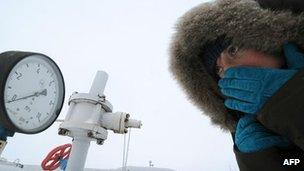Gas price up on cold snap and Russian shortage reports
- Published

Russia and Ukraine have had disputes over gas in the past
The price of gas around Europe has risen sharply due to increased demand as a result of the cold weather and reports of reduced supply from Russia.
UK gas for next day delivery reached 75 pence per therm, the highest for over three years, reflecting EU prices.
The European Commission said flow was below normal in Poland, Slovenia, Austria, Germany, Hungary, Bulgaria, Romania, Greece and Italy.
The news prompted a new row between Russia's Gazprom and the Ukraine.
Ukraine row
On Thursday, Gazprom said it was fulfilling its contracts to Europe, and that Ukraine, whose pipelines carry Russian gas to the EU, must be taking more than its contracted share.
The Ukrainian government has denied the claim.
The cold weather spreading from the east has so far been blamed for more than 100 deaths around Europe and has significantly increased demand.
European countries are currently using alternative sources of gas, including extracting gas from storage.
Weather fear
The Commission said its gas coordination group was monitoring the situation.
A Commission spokesperson told the BBC that member states should have supplies to last 30 days in the event of an interruption.
"We have mechanisms on a European level in times of crisis, but we're not in a crisis," said a Commission spokesperson.
"Of course it depends how the situation evolves and of course how the weather forecast looks like."
The price increase started as freezing temperatures arrived around the continent at the start of the week, prompting the UK and other EU countries to draw on their reserves.
"Last year we had all the cold weather in December and it took a lot out of storage; this year we have a lot more to offer, those storage stocks are going down quickly but from a much higher level," said Edward Cox from energy experts ICIS Heren.
Analysts said it was too early to gauge the impact on domestic energy bills, which will depend on how much gas is taken out of storage and therefore has to be replaced later in the year.
- Published12 January 2012